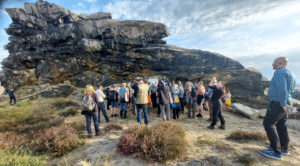Call for applications IUBS-INQUA conference
IUBS-INQUA-ISZS-IOP Research Proposal Writing Workshop for ECRs
The palaeontological record offers critical insights into past biodiversity. When combined with well-calibrated data and indicators of climate change, it can reveal how climatic fluctuations have influenced biodiversity at both regional and global scales. For example, the Quaternary period, covering the past 2.58 million years, is marked by dramatic climate variability. Fossil evidence from this era provides detailed accounts of shifts in community composition, as well as the evolution and extinction of species. Such data holds considerable promise for predicting future biodiversity trends. However, this potential remains underutilized—palaeontological data have yet to be integrated into IPCC reports. Bridging this gap presents an opportunity and a challenge for palaeontologists and conservation biologists to collaborate more closely.
IUBS partners with International Union for Quaternary Research – (INQUA) and several IUBS scientific members, including International Society of Zoological Sciences (ISZS), International Organisation of Palaeobotany (IPO), International Federation of Palynological Societies (IFPS), and International Association for Aerobiology (IAA) to conduct a 5-day workshop in June 2026 at the Indian Institute of Science, Bangalore, India.
This workshop is aimed primarily at Early Career Researchers (ECRs), with a maximum of 25 selected participants. Its main focus is to discuss research topics that intersect contemporary and paleo-biodiversity in terrestrial and aquatic environments, and to develop at least two research proposals that can be submitted for global funding to illustrate the power of palaeobiology in informing present-day climate change impacts on biodiversity. It will also address research methodologies and identify gaps in the analyses.
Owing to the location of the workshop in India, preference will be given to ECRs from Africa and Asia, although all ECRs are welcome to apply.
Early Career Scientists
In your application, please indicate why you are interested in this workshop and how your work relates to the goal of integrating contemporary ecology with paleobiology. This should be presented in a two-page write-up along with your CV. Please submit your application by 15 November 2025 to both the IUBS and INQUA secretariats at secretariat@iubs.org and info@inqua.org, respectively.
While your local accommodation and meals will be free of charge, you will need to arrange your own travel. However, financial support for travel expenses will be available for some applicants. If you wish to request this support, please include a brief justification and an estimate budget in your application. Online resources and guidance will be provided for visa application.
Deadline to submit your application: 15 November 2025
Latest developments
View moreLatest developments Podcast INQUA India 2027
Podcast INQUA India 2027Quaternary is the age when modern recognisable humans started inhabiting this planet. All over the world scientists are engaged in studying various aspects of human evolution. Once every 4 years scientists from all across the…
 International Summer School 2026 – Climate change in coastal areas: hot topics, future projections, impacts
International Summer School 2026 – Climate change in coastal areas: hot topics, future projections, impactsInternational Summer School 2026 – Climate change in coastal areas: hot topics, future projections, impacts 3-6 June 2026, Venice (Italy)
 Loess Fest 2026
Loess Fest 2026Echoes of the past: Loess, climate and human interactions during the Pleistocene will take place between 7-11 September in Krapets, Bulgaria
 Podcast INQUA India 2027
Podcast INQUA India 2027Quaternary is the age when modern recognisable humans started inhabiting this planet. All over the world scientists are engaged in studying various aspects of human evolution. Once every 4 years scientists from all across the…
 PALCOM-supported sessions
PALCOM-supported sessionsINQUA PALCOM interactive bulletin of scientific sessions for the INQUA Congress 2027
 New QP Issue Out!
New QP Issue Out!QP Issue 39 December 2025 is now available online!
More
Activities
ECR activities in INQUA provide an information gateway between young (early-career) and the senior scientists and scientific networks….


